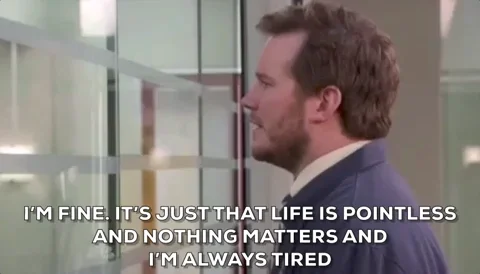
Samir started a new job as a social worker in a busy office in his town.
At first, listening to and caring about people's problems motivated Samir to find solutions to help.
But after a few months, he feels sad and unable to understand and connect with his clients. He is often exhausted and overwhelmed.

Samir is likely suffering from empathy or compassion fatigue: a combination of emotional, physical, and mental effects caused by prolonged periods of caring about or helping others.
Ever felt like that? If so, discover common symptoms and learn ways to overcome empathy fatigue so you can get back to helping others and feeling like your best self!

What does empathy fatigue look like?

Empathy fatigue is our body’s way of signaling when we need to take better care of ourselves and take a step back from caring too much. Here are some common signs according to the Cleveland Clinic:
Mental symptoms
Difficulty relating to others
Feeling disconnected, overwhelmed, or hopeless
Feeling upset or down
Constantly thinking about other people's suffering
Relationship conflicts
Blaming yourself
Lack of focus, low productivity
Physical symptoms
Headaches
Nausea or upset stomach
Difficulty sleeping
Feeling tense
Self-medicating with drugs
Feeling restless
Changes in appetite
Exhaustion

Who is more likely to deal with empathy fatigue?
 Health care professionals
Health care professionals
Healthcare workers are constantly exposed to the trauma and stress of the people they serve. This can impact their emotional well-being. Counselors and therapists also open themselves up to others' pain, issues, and trauma, and they often share and internalize those feelings, too.
 Educators
Educators
Mental health issues in students have been on the rise due to family dynamics, anxiety, violence, and trauma. Teachers, school counselors, and other professionals can absorb a lot of their students' stress into their own lives.
 Journalists and advocates
Journalists and advocates
People who report, research, and work to advocate for others empathize with people’s challenges. With repeated exposure to difficult stories and situations, these professionals can end up facing challenges in coping and regulating their own relationship with trauma.
 Anyone can feel it, though!
Anyone can feel it, though!
From caring for others, like a loved one, to reading the news about difficult situations all over the world today, any of us can suffer the symptoms of empathy fatigue after a while.
How can I prevent empathy fatigue?

ABCs of prevention
These are the three action areas to prevent empathy fatigue:
Awareness
Be aware of cases and situations that trigger the strongest reactions in you.
Don’t turn away from difficult feelings. Facing them means you can handle them.
Practice mindfulness by meditating or being present without interruptions to reflect on your thoughts and emotions.
Balance
Take breaks from caring for others and treat yourself with kindness and patience.
Make time for positive things and set healthy boundaries for yourself.
Take a break from social media or too much news scrolling if that triggers you.
Look for medical help if symptoms are too much to handle on your own.
Connections
Focus on your relationships with others.
Call loved ones, visit friends, or spend time with a pet.
Talk to a colleague or friend about your feelings.
Doctor Susan David argues that there is no limit to how much empathy you can feel, but you must find ways to regulate their emotions, set boundaries, manage self-care, and understand what is within your circle of control:
Quiz Time!

Remember Samir, our social worker experiencing signs of empathy fatigue? What steps could he take to improve his symptoms of empathy fatigue?
A. He should try to keep his feelings in check by not paying attention to them.
B. Samir should open up to a trusted friend about his worries.
C. He could travel somewhere or visit a restaurant that has his favorite dish as a way to unwind and treat himself to something nice.
D. He should keep a journal or meditate to understand his feelings and thoughts better.
Quiz
Select all that apply:
Take Action
Congratulations! You're on your way to feeling healthy and productive again.

Don't forget to:
Your feedback matters to us.
This Byte helped me better understand the topic.
